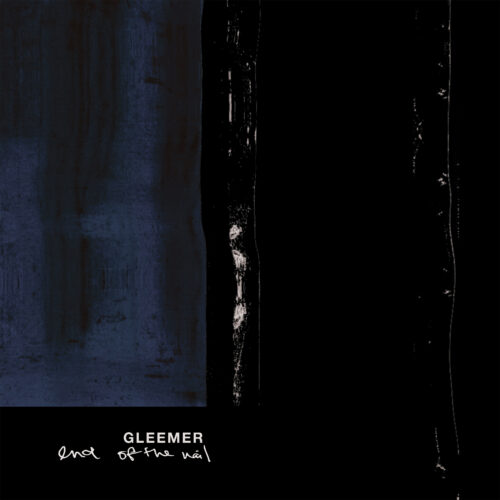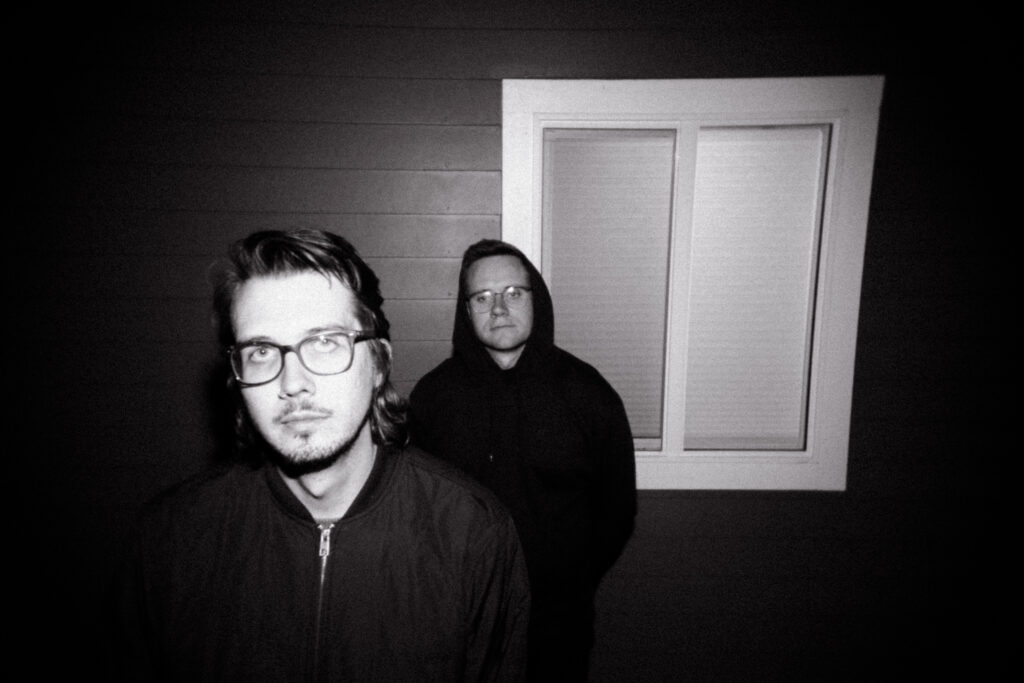Posted: by The Alt Editing Staff
Photo by Samuel David Katz
My introduction to Gleemer came rather late in their career when their fifth album Down Through was released during the pandemic four years ago. Somehow it had all the right components for the time: gentle, melodic, and brooding with ample room for my own thoughts and feelings. In the year that followed, I remember still being in the middle of it–trying to pinpoint what exactly it was that struck me about it. Maybe it was Will Yip’s instinctive production and engineering. Maybe it was its melancholia, dripping with depictions of the minute things that tie us to one another. Over time I would go back through their albums and for the most part, I’d find the same familiar feeling. The casual devastation they’ve steadily mastered.
For over ten years, Gleemer have grasped hold of fleeting emotions and allowed them to billow out into something more tangible. They have written extensively from a perspective that resembles what it would feel like sifting through distant recollections of the smallest moments that can only ever be accessed once everyone else has gone home, and they’ve done it exceedingly well.
On their self produced sixth album End of the Nail, they continue traversing the lines between emotional alternative rock and slowcore, cultivating contemplative ballads with the same intimate core they have always led with to quietly become one of the best bands in the last decade. It’s one of their most darkly introspective albums yet, and I spoke with Corey Coffman about his creative process, his relationship with recording vs performing, and his hopes for those who listen to the album below.
The last full-length album you guys put out was released during the pandemic in 2020. In the time since then, how have these last few years shaped the new album for you? What feelings did you want to convey or explore on this album?
We’ve evolved a lot as songwriters, and I wanted to explore a more nuanced set of feelings with this record—to make songs that are a bit more challenging and subtle, but maintain a lot of the melancholy themes we’ve explored in the past. We wanted to make something that felt like a culmination of what we’ve been trying to do since we started. It’s about the ways we try to create lasting meaning, and what that takes from us.
You’ve mentioned in the past that you’re not necessarily always drawing from personal experiences when writing and that sometimes it’s more observational. What were some points of inspiration for you during the writing process this time around?
Abstraction has always been more interesting to me than clarity in art. For me, music’s ability to be obscured but still so tangible emotionally is beautiful. When I make music, I feel like I’m only making half of the experience. We’re all so complex as individuals, and it’s important to me to create places to explore those feelings rather than tell a specific story of my life.
For inspiration, we usually come with some starting point, whether it’s a riff, or a scene from a movie. We try to be very observant of people and nature when we’re making a record—what catches our eye in a way we can’t explain? It’s about exploring those feelings, however refracted.
Was there a similar approach to the writing as before where you wrote most of the music or were other members involved in that aspect?
This album was entirely Charlie [O’Neil] and I. We co-opted pretty much every idea from start to finish. We’ve known each other for so long and feel free to tell each other when something’s working, and when something’s not. We’re intentional about where we write songs. Some came together in a dingy basement, some on a sunny porch, and then we worked them out more fully in the studio.
When you’re recording and mixing your own music with Gleemer, is that approach different from when you’re working on other band’s albums (i.e., Prize Horse, Flower Language, Ridgeway, Modern Color, etc.)?
I try to approach every record I work on in a new way. There are obviously learned processes that just make things easier, but the creative element can’t be transferred most of the time. With Gleemer’s music, it’s so helpful to have Charlie around for mixing, etc. Normally, I’m acting as the outside perspective on someone else’s voice, but when it’s my own voice I’m mixing, I need some outside input from a trusted person.
Gleemer doesn’t seem to tour too often, and so I wanted to ask if the recording process is perhaps more fulfilling for you than the performance aspect?
Creating a record is my favorite part of the process, but the community that’s developed through playing live is undeniable. I find myself torn about it at times. Before a record is even out, I’m ready to be writing again. I should be practicing my songs for performance instead, but it takes more effort for me to get into that headspace. Ultimately, I think the back and forth is healthy, although I fight it sometimes.
From your music and even the work you do as a producer/engineer, you seem very in tune with your inner world in a way that I think seems to disregard all the trends that come up with a lot of current music today. There’s a particular focus on the atmosphere of your albums that always feel well thought out and I was wondering if world building is something that you aim to create when you’re writing music?
Atmosphere is critical for me. It’s an incredibly delicate thing, but it helps to not think about it that way. Excessive control leads to poor music, so I try to ensure my emotions are accessible and just let the song be what it wants to be from there. Creating an effective atmosphere is more about being observant and respecting what’s going on around you than about control.
What does the album title End of the Nail mean for you?
I think in some way we’re all trying to be remembered. My efforts at times feel like I’m being driven into material, splitting what’s in front of me, but also becoming a part of it. It’s describing that focal point.
There are interesting moments throughout the album whether it’s the backtrack in “Lifetime,” or a guitar melody, or singular lyric that stand out like the last line in “The Body’s Worth” or “Silver Pin” and others. Were there any particular bands you felt inspired by lyrically or sonically for this album?
Charlie and I reference other recordings all the time. It’s so fun to draw on tones and creative ideas from other artists. As far as specifics, I was listening to a lot of Elliott Smith’s self-titled, and [Radiohead’s] OK Computer, but I would never really compare our music to theirs.
Sometimes when I need a weird sound I’ll sample something from an old VHS tape and manipulate it to fit the emotion. I love how a little bit of talking can affect a song, even if you can’t tell what’s being said.
My personal favorite track on the album is “First Dream,” and I wanted to ask how that song in particular came about and what it addresses for you?
“First Dream” is one of the original songs we wrote before the album had even taken shape. Charlie came to me with the acoustic part, and it slowly came together from there. That song in particular for us feels like a sharper version of some of Gleemer’s older stuff. On a personal level, it’s sort of about me reckoning with my own death, whenever that comes.
What are your favorite songs on the album?
“Half Smile,” “First Dream,” and “Behavior” are probably my front runners.
In the past, all of the album artwork seems centered around photos that help establish the tone of the album. How did the artwork for this one come together?
Charlie and I had the idea of a cover that put more pressure on the music. I gave some general direction to my wife Alex about a single-color, focused idea, and she took it and ran. I was actually out of town one weekend in June and she sent me a bunch of scans of oil pastel abstract pieces she made, and it all coalesced from there. The handwritten title really helped solidify the vision. We saw what she’d done, and were just like there it is.
What do you hope listeners take from the album?
I hope that it gives people a place of reflection, inspiration, or escape. I hope they can see themselves in it, and feel a bit more understood.

End of the Nail is out tomorrow through Other People Records, and vinyl and merch available here.
—
Loan Pham | @x_loanp
The Alternative is 100% supported by our readers. If you’d like to help us write about more great music and keep our site going, you can become a Patron on Patreon, which also allows you to receive extra content, sweet perks, and The Alternative merch, with levels starting at only $2 per month. Everything helps, and if you can’t afford to donate, consider sharing this article and spreading the word about our site! Either way, thanks for reading!


